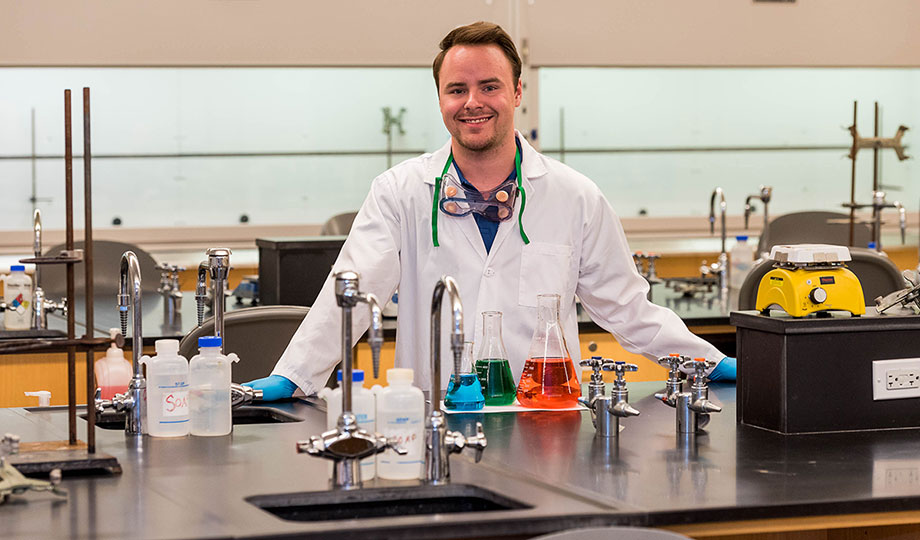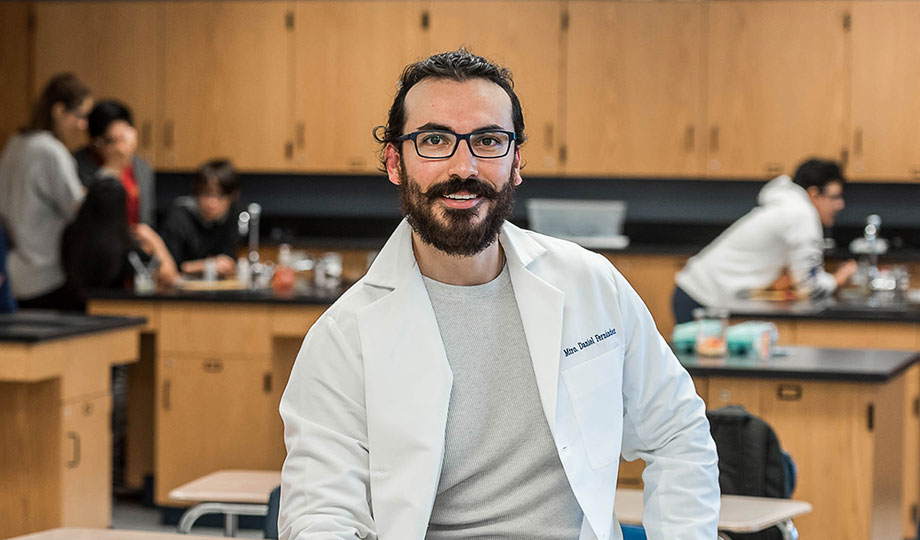The Chemistry program at College of DuPage offers courses for liberal arts and health science students, engineers and chemistry, biology and physics majors. The program has several entry-level chemistry courses plus classes in organic chemistry and introductory biochemistry.
Students interested in continuing their education as a chemistry major can follow the Chemistry Transfer Pathway or Biochemistry Transfer Pathway and earn an Associate in Science degree. Chemistry majors should possess good communication, math and computer skills.
Chemists work in the pharmaceutical, paper, oil, biotechnology and consumer product industries and concentrate on specific areas of chemistry including forensic science, genetic engineering, environmental chemistry, chemical engineering, materials science or chemical education.
Determine Your Path
Many careers in chemistry require a bachelor's degree while others require a master's degree or a doctorate.
Whether you are completing your general education requirements or planning to transfer and major in chemistry, COD offers:
- Dedicated instructors with years of professional experience.
- Instruction utilizing state-of-the-art equipment and resources.
- Affordable courses to help you achieve success without creating overwhelming debt or draining your savings account.
- Small class sizes to ensure you receive personalized attention.
Chemistry Transfer Pathway, A.S.
What is a Transfer Pathway?
A transfer pathway represents a typical course schedule/sequence for a student planning to complete the A.S. degree within two years, then transfer and major in a specific discipline. A transfer pathway is not institution-specific.
It is important to understand that the pathway provided in the adjacent tab is just one possible combination of classes by which to complete an A.S. and prepare for transfer in your chosen area of study. Other course combinations and sequences can work, too. It is strongly recommended that students work directly and frequently with a COD academic counselor/advisor, a COD faculty advisor, and academic counselors/advisors at potential transfer schools, to develop and execute a plan that works best for them.
Biochemistry Transfer Pathway, A.S.
What is a Transfer Pathway?
A transfer pathway represents a typical course schedule/sequence for a student planning to complete the A.S. degree within two years, then transfer and major in a specific discipline. A transfer pathway is not institution-specific.
It is important to understand that the pathway provided in the adjacent tab is just one possible combination of classes by which to complete an A.S. and prepare for transfer in your chosen area of study. Other course combinations and sequences can work, too. It is strongly recommended that students work directly and frequently with a COD academic counselor/advisor, a COD faculty advisor, and academic counselors/advisors at potential transfer schools, to develop and execute a plan that works best for them.
College of DuPage also offers institution-specific information to help prepare you to transfer to a four-year college or university; please visit the transfer opportunities page for more information.
Get Started Today
The first step to getting started in chemistry is to apply for admission.
Academic and Career Pathways give you a roadmap to achieving your career goals. Follow a pathway based on your degree or certificate that outlines which classes you need to take and when so you graduate on time or move on to the next phase in your career.
Students who complete courses in Chemistry will:
- Recognize, interpret, and critically evaluate scientific information.
- Collect and analyze qualitative and quantitative data
- Apply chemical principles and concepts, as appropriate for the class level.
Source: 2018 Chemistry Annual Update submission
If you are considering this program as an area of study, consult with a faculty member in this field.
College of DuPage partners with several four-year institutions to help students seamlessly complete a bachelor’s degree in chemistry. Students can connect with Transfer Services for personalized guidance on transfer opportunities.
For more information about Transfer Pathways, visit the College of DuPage Catalog. The pathway outlines a typical two-year course plan for completing an AA or AS degree before transferring to a four-year program. Course requirements vary by institution, so consult your faculty or academic advisor for specific guidance.
Articulation Agreements
College of DuPage maintains transfer agreements with many colleges and universities to ensure a smooth transition toward a bachelor’s degree. These agreements often include a defined course sequence. Students should regularly meet with a faculty member or Advising Services to stay on track.- Aurora University, AS to Bachelor of Science in Chemistry
- Aurora University, AS to Bachelor of Science in Chemistry with Master of Arts in Teaching Plus One
- Elmhurst University, AS to Bachelor of Science in Chemistry with Licensure
- Elmhurst University, AS to Broadfield Science Secondary Education Licensure with Chemistry Concentration
- Elmhurst University, AS to Bachelor of Science in Chemistry
- Midwestern University, Pre-Pharmacy Advantage Program
- Roosevelt University, Doctor of Pharmacy Community College Pathways Program
Transfer Guides
Beyond articulation agreements and guaranteed admission programs, College of DuPage courses transfer to many other institutions. Transfer Guides help students select COD courses that meet prerequisites for specific majors and include details such as contact information, major requirements, general education requirements, and transfer policies.Career Information
Explore careers based on your interest, location and salary range or view top occupations by income.







